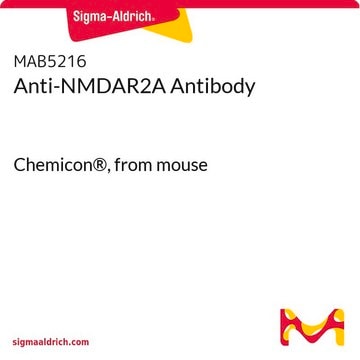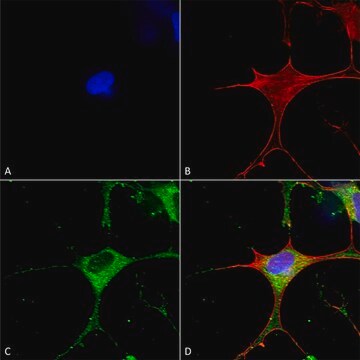AB1555P
Anti-NMDAR2A Antibody
Chemicon®, from rabbit
Synonym(s):
N-methyl D-aspartate receptor subtype 2A, N-methyl-D-aspartate receptor subunit 2A, NMDA receptor subtype 2A, glutamate receptor, ionotropic, N-methyl D-aspartate 2A
About This Item
Recommended Products
biological source
rabbit
Quality Level
antibody form
affinity purified immunoglobulin
antibody product type
primary antibodies
clone
polyclonal
purified by
affinity chromatography
species reactivity
rat, human, mouse, fish
manufacturer/tradename
Chemicon®
technique(s)
immunohistochemistry: suitable
immunoprecipitation (IP): suitable
western blot: suitable
NCBI accession no.
UniProt accession no.
shipped in
dry ice
target post-translational modification
unmodified
Gene Information
human ... GRIN2A(2903)
General description
Specificity
Immunogen
Application
3 μg of a previous lot was used to (under appropriate conditions) quantitatively immunoprecipitate all NMDAR2A in 200 μg of rat brain.
Immunohistochemistry:
A previous lot of this antibody was used at 1:1,000-1:2,000 dilution.
Optimal working dilutions must be determined by the end user.
Neuroscience
Neurotransmitters & Receptors
Quality
Western Blot Analysis: 1:500 dilution of this lot detected NMDAR2A on 10 μg of Rat Brain Microsomal lysates.
Target description
Physical form
Storage and Stability
Handling Recommendations:
Upon first thaw, and prior to removing the cap, centrifuge the vial and gently mix the solution. Aliquot into microcentrifuge tubes and store at -20°C. Avoid repeated freeze/thaw cycles, which may damage IgG and affect product performance.
Analysis Note
NMDAR2A is present in high concentrations in the hippocampus.
Other Notes
Legal Information
Disclaimer
Not finding the right product?
Try our Product Selector Tool.
recommended
Storage Class Code
11 - Combustible Solids
WGK
WGK 1
Certificates of Analysis (COA)
Search for Certificates of Analysis (COA) by entering the products Lot/Batch Number. Lot and Batch Numbers can be found on a product’s label following the words ‘Lot’ or ‘Batch’.
Already Own This Product?
Find documentation for the products that you have recently purchased in the Document Library.
Our team of scientists has experience in all areas of research including Life Science, Material Science, Chemical Synthesis, Chromatography, Analytical and many others.
Contact Technical Service






